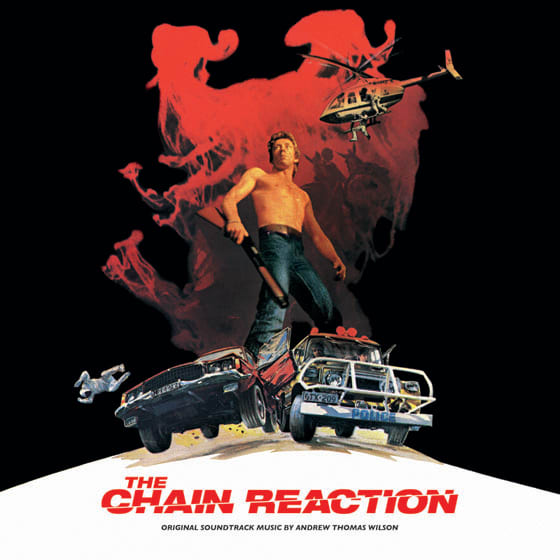Not to be confused with the 1996 film in which Keanu Reeves played a smart guy, The Chain Reaction is Ian Barry's 1980 tale of corporate evil exposed through a nuclear disaster threatening to contaminate the water supply, and the unlikely heroes who rise up to warn the people. It's a classic of its kind, one of the seminal films from the first wave of Ozploitation films. The film draws easy comparison to Mad Max with so many cast crossovers, namely star Steve Bisley (who played Max's partner), while Hugh Keays-Byrne (a.k.a. Toecutter) appears in a supporting role and Roger Ward and Mel Gibson show up for brief cameos. Its adrenaline-fuelled vehicular mayhem helps that comparison along too, while the nuclear apocalypse cover-up adds a China Syndrome angle.
While the cast is solid and Barry's direction full of brilliantly stylized choices, a major part of the film's overall excellence is its score, by Andrew Thomas Wilson and Spencer Lee. With Lee producing and engineering, Wilson utilized everything from clavinet, Mellotron and synths of the Moog and Oberheim variety to grand piano, wind chimes and clock springs in order to create a soundtrack that enhances every aspect of the film. It blurs the lines between diegetic and non-diegetic sound, and foreshadows the outcome without giving it all away. When the film's protagonist, driving his souped-up Holden HJ One Tonner on his way to save his wife, reaches over and slaps a cassette into his stereo, and the head-banging electro-pop of "Car Chase" kicks in, it's one of those perfect cinematic moments. It clinches the feeling of the film, as fun as it is intense — and the score accentuates all of it.
Granted, there is a little cheese in this soundburger, with the Chopin-indebted synth-flute noodling of "Heinrick's Theme" being particularly sappy, but the rest easily endears itself to the era and the style of the film. Its blend of Kraftwerk synthesis, new-wave pop, classical composition and Pink Floyd experimentation make it sound radioactive and retro-futuristic. When that Phil Collins-esque drum fill thunders and that lofty '80s stadium rock guitar kicks in amidst the twinkling pad, synth bass and dilapidated piano, it makes "Message to a Friend (End Titles)" a defining track on its own merit, the crate-diggers dream that makes the soundtrack an essential purchase. But, to be fair, the complete work is easily up there with the best scores of John Carpenter and Vangelis.
Granted, this Dual Planet pressing isn't quite as nice as the label's other efforts. It's not a gatefold, and only Miles Brown of the Night Terrors lends his endorsement, as printed on its inner sleeve. Yet, it has been lovingly remastered on solid 180-gram vinyl, and, despite a couple of small mistakes, Brown nails his passionate write-up. As he says, Dual Planet did the world a favour by getting this brilliant work back in print.
(Dual Planet)While the cast is solid and Barry's direction full of brilliantly stylized choices, a major part of the film's overall excellence is its score, by Andrew Thomas Wilson and Spencer Lee. With Lee producing and engineering, Wilson utilized everything from clavinet, Mellotron and synths of the Moog and Oberheim variety to grand piano, wind chimes and clock springs in order to create a soundtrack that enhances every aspect of the film. It blurs the lines between diegetic and non-diegetic sound, and foreshadows the outcome without giving it all away. When the film's protagonist, driving his souped-up Holden HJ One Tonner on his way to save his wife, reaches over and slaps a cassette into his stereo, and the head-banging electro-pop of "Car Chase" kicks in, it's one of those perfect cinematic moments. It clinches the feeling of the film, as fun as it is intense — and the score accentuates all of it.
Granted, there is a little cheese in this soundburger, with the Chopin-indebted synth-flute noodling of "Heinrick's Theme" being particularly sappy, but the rest easily endears itself to the era and the style of the film. Its blend of Kraftwerk synthesis, new-wave pop, classical composition and Pink Floyd experimentation make it sound radioactive and retro-futuristic. When that Phil Collins-esque drum fill thunders and that lofty '80s stadium rock guitar kicks in amidst the twinkling pad, synth bass and dilapidated piano, it makes "Message to a Friend (End Titles)" a defining track on its own merit, the crate-diggers dream that makes the soundtrack an essential purchase. But, to be fair, the complete work is easily up there with the best scores of John Carpenter and Vangelis.
Granted, this Dual Planet pressing isn't quite as nice as the label's other efforts. It's not a gatefold, and only Miles Brown of the Night Terrors lends his endorsement, as printed on its inner sleeve. Yet, it has been lovingly remastered on solid 180-gram vinyl, and, despite a couple of small mistakes, Brown nails his passionate write-up. As he says, Dual Planet did the world a favour by getting this brilliant work back in print.
